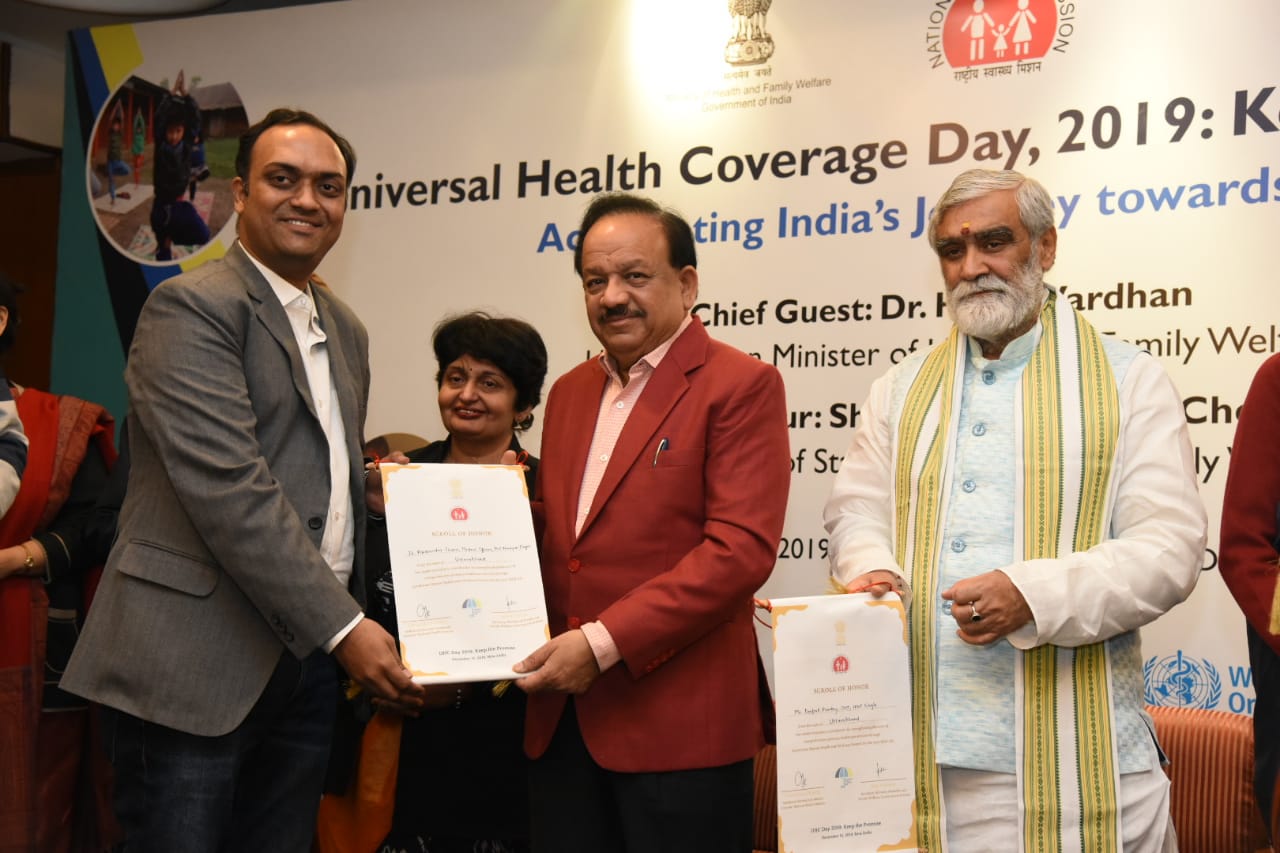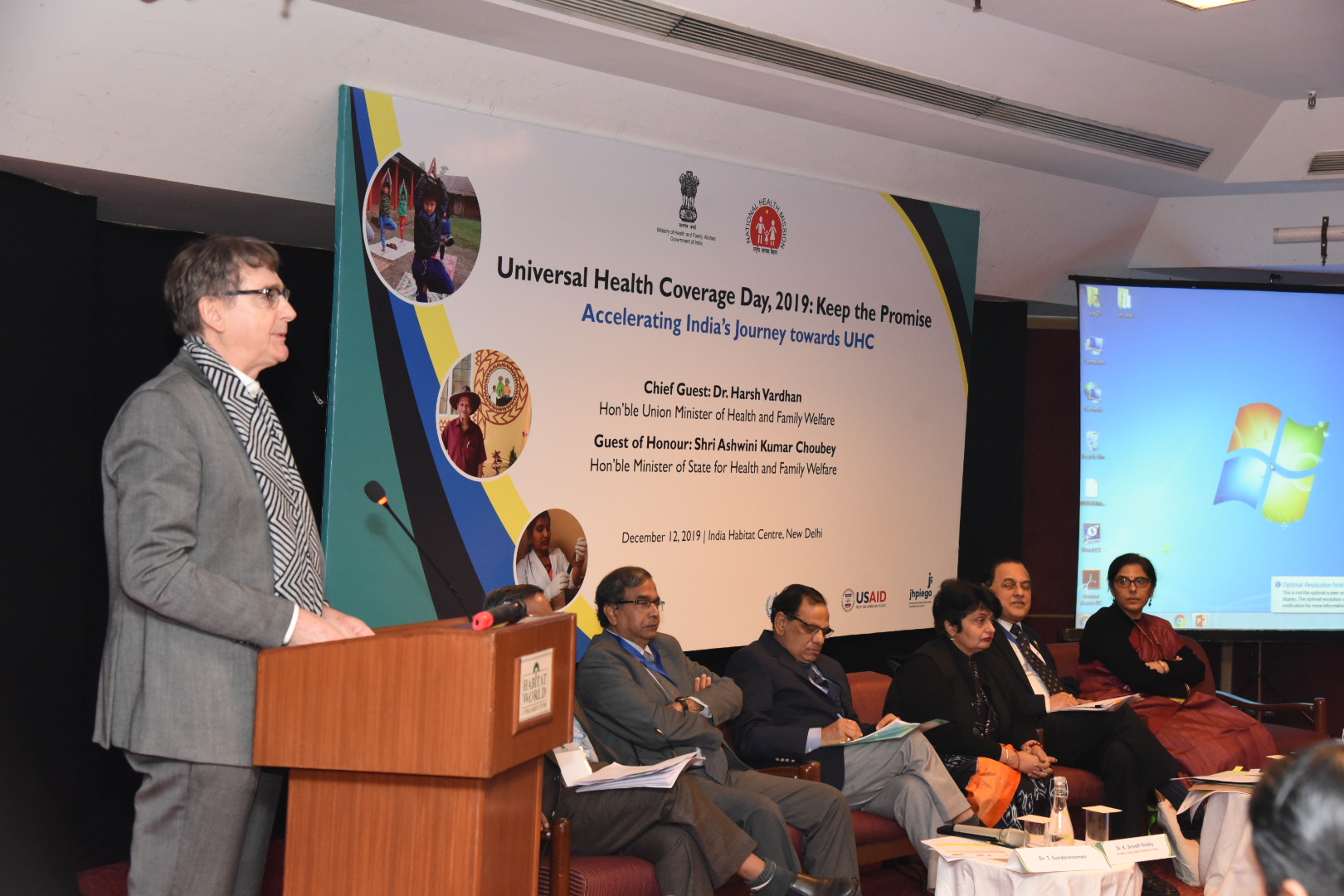Key highlights:
- Dr Harsh Vardhan, Union Minister of Health & Family Welfare, Govt of India conferred UHC Awards to best performing Primary Healthcare teams of States and UTs.
- Guidelines on Comprehensive Primary Health Care for Ayushman Bharat-Health and Wellness Centres (AB-HWCs), Synthesis Report on Regional Workshops on AB-HWCs, Oral Healthcare Guidelines, and AB-PMJAY 2020 Calendar released along with the launch of the revamped AB-HWC portal.
- UHC Day was first commemorated on 12 December 2014. It was officially designated as International UHC day 2017 to marks the anniversary of the landmark UN resolution.
12 December 2019, New Delhi: The International Universal Health Coverage (UHC) Day 2019 was commemorated at an event titled ‘Keep the Promise: Accelerating India’s Journey towards UHC’, organized by Ministry of Health & Family Welfare (MoHFW) in collaboration with WHO Country Office for India, Jhpiego and USAID. The occasion got together the thought leadership under one platform – to keep the promise of health for all, take stock of the country’s progress towards universal health coverage (UHC) and deliberate upon next-steps.
To mark the UHC Day, the ministry organized three Policy Labs for extensive brainstorming with the state health care teams on the themes – comprehensive primary health care in urban areas; strengthening primary health service provision and delivery systems; and communitisation for wellness. Community-based frontline health workers have a key role to play in addressing the need and demand for essential health services. In this regard, the policy labs enabled active interaction, sharing of ideas and knowledge exchange with the frontline health workers that will guide policy to drive the UHC agenda strategically.

“Concerted actions by coming together of varied stakeholders is must and for that the government departments at all levels, along with non-state actors and organizations must engage in a constructive, smart and intelligent manner, to accelerate towards UHC. Health is a multi-sectoral, multi-dimensional and complex sector; and achieving the agenda of ‘Health for all’ requires the buy-in of all the key stakeholders”, he further added.
Dr Poonam Khetrapal Singh, Regional Director, WHO SEARO in her address stated that the pursuit of UHC must be a collective endeavour. Increasing engagement with all stakeholders, including communities, civil society and, where appropriate, the private sector is core to ‘keeping the promise’. Innovative forums such as national health assemblies or youth town halls provide important avenues for political leaders to include civil society in policy dialogue and to ensure people’s voices and concerns are heard. That in turn increases public buy-in for UHC and promotes accountability and trust. Both outcomes are essential to our journey.

Dr Preeti Sudan, Health Secretary, Union Ministry of Health and Family Welfare in her inaugural address spoke about some of the notable steps undertaken by the government such as the National Medical Commission Act 2019 that improves access to quality and affordable medical education, banning of e-cigarettes, approving 22 new AIIMS, and up-gradation of 157 District hospitals as medical colleges and ensuring UHC via National Health Policy 2017 and Ayushman Bharat.
“We have the collective will to ensure UHC, but we must reflect upon the ground challenges that exist vis-à-vis expanding population and increasing disease burden. Accountability and ownership by the health and wellness centers (HWCs) are imperative to move ahead; and we must look into setting up an institutional arrangement and social audit of health and wellness centers, for which the preparation of guidelines is already under-way”, she stated. The deliberations in Three Policy Labs will help us strategize better to move ahead, she further added.
Dr Vinod K. Paul, Member, NITI Aayog in his address articulated the importance of increased funding by both the centre and state governments, provision of adequate infrastructure, and a specialized workforce – that includes general practitioners, specialists, nurses and paramedical staff, for strengthening and reinforcing UHC. Dr Paul underlined the importance and urgent need for improving urban primary healthcare services in India. He mentioned that UHC day is also a day when we look back and celebrate our successes accrued through initiatives such as Poshan Abhiyaan and Swachch Bharat Abhiyaan under which rural India has achieved Open-Defecation free (ODF) status.
Reiterating that increased health budget, adequate Infrastructure and a specialized work force is vital to reinforce UHC, he appealed to the state government representatives to adhere to NHP suggestion to raise the state health budget to the tune of 8% of the overall budget. The public-sector expansion must happen and the involvement of the private sector to address infrastructure needs cannot be overemphasized.
Among the dignitaries present at the event were: Shri. Ashwini Kumar Choubey, Minister of State for Health and Family Welfare; Dr. Indu Bhushan, CEO (NHA), Dr. Sanjay Tyagi, DGHS, Dr. Poonam Khetarpal Singh, Regional Director, WHO SEARO, Smt. Vandana Gurnani, AS&MD (NHM) along with the Health Secretaries and Mission Directors from the States, senior officers of MoHFW and representatives of CSOs, NGOs and Development Partners.
